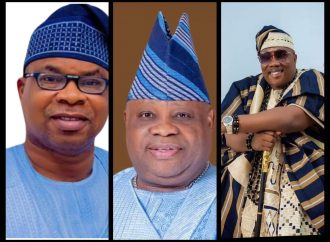Sharia Law In Southwest Nigeria: 8 Thing You Need To Know By Henry Olamilekan Ojo. How Sharia Law Came to Be in Nigeria Sharia law in Nigeria has a long and complicated past that is deeply connected to the religious, political, and legal changes in the country. It has been done in the northern area
Sharia Law In Southwest Nigeria: 8 Thing You Need To Know By Henry Olamilekan Ojo.
How Sharia Law Came to Be in Nigeria
Sharia law in Nigeria has a long and complicated past that is deeply connected to the religious, political, and legal changes in the country. It has been done in the northern area for hundreds of years, changing from Islamic rule before European colonization to current legal debates.
Pre-Colonial Era Islam was brought to Nigeria through trade and migration, especially by Arab and Berber merchants from North Africa and the Middle East. Islam had spread to the Kanem-Bornu Empire and then to the Hausa city-states by the 11th century.
Sharia law became part of the political and legal systems in these areas when they accepted Islamic governance. Rulers such as the Shehu of Borno and Usman dan Fodio (founder of the Sokoto Caliphate) formalized Islamic legal concepts, making Sharia the dominant legal framework in northern Nigeria.
 S’West Muslim Clerics Vow To Move Against Anti-Sharia Politicians
S’West Muslim Clerics Vow To Move Against Anti-Sharia Politicians
Time of the Colonies (1900–1960)
When the British took over a colony, the colonial government tried to make Islamic law part of the overall legal system. The British let Sharia stay in use in civil and personal issues, but they limited its use in criminal cases. Instead of harsh Islamic punishments, they used English common law principles. The colonial government also set up native courts that used a mix of Islamic, colonial, and local rules.
Sharia Law In Southwest Post-Independence Period (1960–1999)
After Nigeria gained independence in 1960, the legal system stayed a mix of English common law, customary law, and Islamic law. Sharia courts were recognized by the Constitution of 1979, but they could only handle personal issues like marriage, inheritance, and religious endowments (waqf). However, there were debates over the extent of Sharia’s application, especially regarding criminal cases.
Sharia Law In Southwest The Introduction of Full Sharia (1999–Present)
A major turning point came in 1999 when Zamfara State, under Governor Ahmad Sani Yerima, reintroduced full Sharia law, including criminal punishments such as amputation for theft and stoning for adultery. Other northern states, including Kano, Sokoto, and Kaduna, followed suit, adopting Sharia-based legal systems. This move sparked national and foreign debates about human rights, religious freedom, and Nigeria’s secular status.
Despite controversies, Sharia law continues to be applied in twelve northern states, mainly in cases involving Muslims. However, challenges remain regarding its compatibility with Nigeria’s constitutional framework, especially concerning human rights and female equality.
The Introduction of Sharia Law into Southwest Nigeria: Tensions and Aspirations in Yorubaland Introduction
Southwest Nigeria, home to the Yoruba people, is an area renowned for its cultural diversity and religious pluralism. Unlike the predominantly Muslim North or the Christian-dominated Southeast, Yorubaland has kept a delicate balance among Islam, Christianity, and indigenous Yoruba traditions for centuries.
HRM Oba OmoTooyosi Lecture Sultan Of Sokoto On Sharia In Yorubaland
However, in recent years, murmurs—and rarely overt efforts—to bring Sharia law into this region have emerged, igniting debates about identity, governance, and the future of religious coexistence. As of February 22, 2025, these developments remain a contentious problem, reflecting broader national tensions within Nigeria’s multi-religious society. This study examines the historical backdrop, recent efforts, key actors, and the socio-political consequences of introducing Sharia law into Southwest Nigeria.
Historical Context: Sharia in Nigeria and Yorubaland’s Distinct Path
Sharia law has deep roots in Nigeria, especially in the northern regions, where it ruled societies like the Sokoto Caliphate before British colonization in the 19th century. Under colonial rule, Sharia was confined to personal and civil issues, such as marriage and inheritance, a compromise that continued into Nigeria’s post-independence era.
The late 1990s marked a turning point when Zamfara State, led by Governor Ahmad Sani Yerima, brought Sharia into criminal law in 1999, a move that spread to twelve northern states by 2002.
This expansion created Sharia courts with authority over crimes like theft and adultery, often accompanied by harsh punishments such as amputation or stoning, though such penalties have been rarely enforced in practice.
Yorubaland, however, took a different trajectory.
Islam came in the Southwest through trade and scholarship as early as the 14th century, coexisting alongside Christianity (introduced in the 19th century) and Yoruba traditional religion. The region’s Muslims, while devout, have traditionally embraced a moderate, syncretic form of Islam, often blending it with local customs.
Sharia in Yorubaland has generally been limited to informal mediation or personal law, administered by local Islamic leaders, rather than a state-enforced legal system. This moderation, coupled with the Yoruba’s strong cultural identity, has made the area resistant to the kind of religious extremism seen elsewhere in Nigeria.
Sharia Law In Southwest Recent Efforts to Introduce Sharia Law in the Southwest
In the past decade, sporadic proposals to spread Sharia law into Yorubaland have surfaced, driven by a mix of religious zeal, political opportunism, and external influences. While no Southwest state has officially adopted Sharia as part of its legal framework by February 2025, several events have fueled speculation and concern:
Advocacy by Islamic Groups: Organizations such as the Muslim Rights Concern (MURIC), led by Professor Ishaq Akintola, have intermittently called for the approval of Sharia courts in the Southwest. MURIC believes that Muslims in the region, who constitute roughly 40–50% of the population, deserve access to Sharia-based adjudication for civil matters as a matter of religious freedom. In 2023, MURIC petitioned the Lagos State government to create Sharia courts, citing the precedent of northern states and framing it as an equity issue for Muslims in a secular legal system dominated by English common law.
Sharia Law In Southwest Political Maneuvering:
Some politicians have flirted with the idea of Sharia as a means to mobilize Muslim voters in the Southwest, a region important to national elections. During the 2023 general elections, fringe candidates in states like Osun and Oyo made vague references to “enhancing Islamic justice,” though these statements were met with swift backlash and lacked clear policy proposals. Analysts suggest that such rhetoric is less about genuine purpose and more about exploiting religious sentiments in a competitive political environment.
Northern Influence and Migration: The influx of northern Muslims into the Southwest, driven by economic opportunities and instability in the North (e.g., Boko Haram insurgency), has brought with it calls for Sharia-compliant institutions.
In cities like Ibadan and Abeokuta, northern communities have created informal Sharia councils to resolve disputes, though these work outside state authority and have limited influence beyond their enclaves.
Conclusion
Sharia law in Nigeria has grown from a system of governance in pre-colonial Islamic states to a complex legal framework coexisting with secular laws. Its reintroduction in 1999 reignited debates on religious identity, governance, and constitutional rights, making it a major and ongoing problem in Nigeria’s legal and political landscape.





















Leave a Comment
Your email address will not be published. Required fields are marked with *